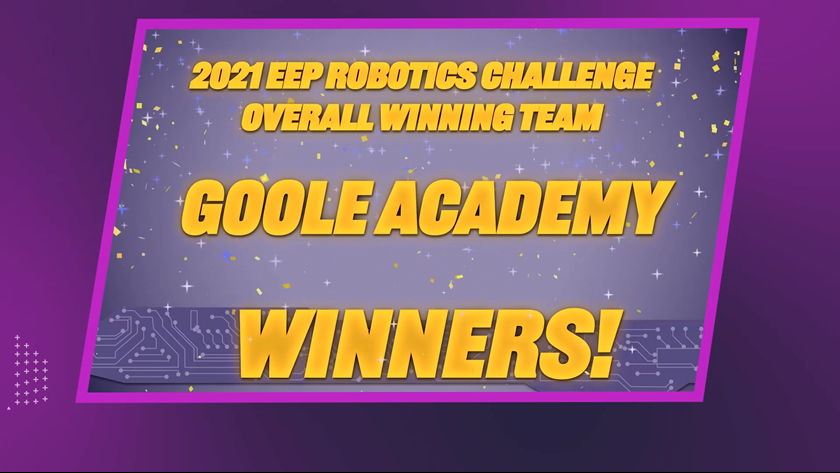Jun 29, 2021
A student team from Goole Academy, East Yorkshire have been announced as the UK winners of this year’s EEP Robotics Challenge.
The winning team competed against hundreds of other students across the country to vie for the top prize. A team from Nonsuch High School for Girls, Surrey were Highly Commended. Teams from Sheffield High School in Yorkshire and McLaren High School in Perthshire also won awards from the judges in categories of robot design and for speed and control respectively.
The full winners for 2021 are:
|
Overall winning team |
Goole Academy |
|
Highly Commended |
Nonsuch High School for Girls |
|
Scratch Project |
Nonsuch High School for Girls |
|
Speed and Control |
McLaren High School |
|
Robot Design |
Sheffield High School |
|
Project Presentation |
Goole Academy |
|
Robot Challenge |
Goole Academy |
Climate-themed missions
The student teams completed a series of missions to discover what engineers can do to create a cleaner, sustainable world. They learnt to build a LEGO® MINDSTORMS® Education EV3 robot and program it to complete a speed and control test and perform a set of environmentally themed tasks such as planting a tree.
Melanie Washington, Director of Engagement Projects at EngineeringUK, said: “The Robotics Challenge gives young people of all backgrounds a chance to experience the variety, excitement and opportunity presented by a career in engineering.
“We’ve been amazed by the commitment students have shown in a particularly difficult year.
“Huge congratulations to all the teams who progressed at regional levels and to overall winners of UK EEP Robotics Challenge finals from Goole Academy.”
Virtual competition
The EEP Robotics Challenge introduces student teams to real-world engineering through technology, robotics and computing tasks. The engagement programme aims to help students put their school learning into context and discover exciting new careers.

This year’s challenge had to be adapted and held virtually for the first time, due to coronavirus. Virtual platforms were used - students used the Scratch platform, which allows young people to create interactive stories, games and animations and teachers were supported via a Microsoft Teams Education platform, which provided support via online chat, meetings and online submission of the Robotics Challenge entries.
Scratch projects mimicked the Challenge Mat that students would ordinarily have access to, to physically program their LEGO robots. This way they could continue to develop their coding skills in a virtual Covid-safe space and then apply their skills to a physical robot when possible.
John Pinkney, Head Reviewer, said: “The creativity, resilience and teamwork skills demonstrated by students taking part in the EEP Robotics Challenge never fails to amaze me.
“It’s inspiring to see how young people from all over the UK rise to the occasion and explore robotics and engineering through this real-world challenge."
Real-world engineering
The EEP Robotics Challenge is led by EngineeringUK and Helsington Foundation in partnership with the Royal Air Force and supported by Rolls-Royce and Network Rail.
Derek Walters, Head of the Helsington Foundation, said: “We’re delighted to have created and given ongoing support to the EEP Robotics Challenge. It provides young people with an opportunity to develop core maths, physics, IT and coding skills that can open doors to an exciting career in engineering.
“We know that participation in the EEP Robotics Challenge will help to increase the diversity and number of young people pursuing engineering pathways, and we’re delighted to have had so many schools take part in the competition this year considering the impact of Covid-19.
“We’re forever grateful for the commitment and professionalism of teachers who support students, who really are the ones mentoring the next generation of engineers.”
Find out more: www.roboticschallenge.org.uk
< Back to News & Views
